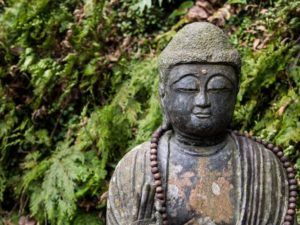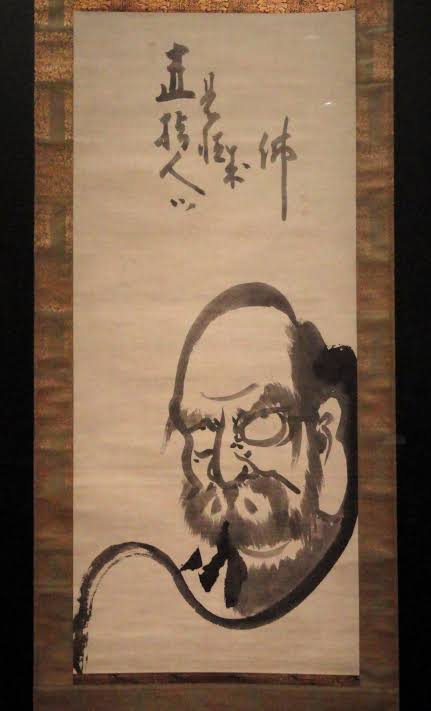The koan of the paradoxical idea of one hand being able to clap has been attributed to the Zen master Hakuin.
Hakuin Ekaku was a famous Japanese Zen master, who lived within the seventeenth and eighteenth centuries. Whether this koan really originated with him or not, we can perhaps not ever be totally sure.
Hakuin once said that not knowing how near the truth is, most people will often seek it far away.
In this statement, it is the secret of all koans as well.
We should never seek the answer, by taking it further away in our minds, or with our minds.
We should silence our mind, and feel the truth, as it arises silently from within our hearts. Only by silencing the noise of our minds, can we ever begin to achieve this.
This particular koan is a simple enough question, indeed.
” What is the sound of one hand clapping? ”
Obviously, if there is a sound, it is the sound of God’s oneness loving, and it could never be heard with our outer ears, but more only ever silently felt, or heard by the inner ears of our own hearts.
Only love can hear silence
Koans are usually associated with Buddhism, and especially Zen Buddhism, but they are also a vital part of some other cultures.
The Hawaiians have, for example, their own Huna koans.
In Hawaiian, this is referred to as, ” nana huna. ”
They mean here a conundrum, a silent paradox, or simply just, a hidden riddle.
” What is the sound of one person loving? ”
This is their version of this same famous koan that I have referred to above, about the sound of one hand clapping.
They have a similar word to this word in their word, ” ka huna. ”
This word, although it means ” the secret, or a secret ”, does not mean it in the English sense of the word. It more refers to something that is hard for us to become aware of, rather than anything that is actually hidden from us.
The word, ” Ka ” on its own means, ” the light. ”
” Huna ” means secrets in the form of truth, knowledge, and wisdom that exists within us all, but that is often beyond what we are yet allowing ourselves to generally normally see.
 A koan opens up this light for us and connects us to our own truths. It does this by allowing us to drop down from our minds to feel the real truth that exists within our hearts.
A koan opens up this light for us and connects us to our own truths. It does this by allowing us to drop down from our minds to feel the real truth that exists within our hearts.
When a Zen master tells us to drop it, we are meant to drop our mind, or whatever it is holding, or still clutching desperately onto, and drop down into the waiting loving arms of our own hearts.
Logically there is no answer for both of these above koans, or for any other koan, for that matter.
The obvious answer would logically be silence in both cases, but the very question implies within the asking that there must be a sound of some sort.
Logically we could say that the wording of the question says that there is clapping and that there is a sound. We just need to find the answer to this riddle.
The only answer is to be found within the second koan.
Love has no sounds, and ultimately neither has one hand clapping.
Oneness can only ever be just oneness, nothing else can exist to itself. No sounds can be heard, for there are no sounds to be heard, and nobody ever to hear them.
This is why a tree falling in the forest makes no sound when nobody is around, or even if someone is around, it makes no sound in the silent heart of a master. The master is always unmoved from his oneness and always operates from unconditional love.
God’s oneness created within himself an infinity of parts or souls. This created the possibility of a relationship because the souls were then given a free consciousness to be able to feel, as being separate from God’s oneness.
This was never a true separation however, and this is what a koan is trying to show us. The answer is always illusionary, for there are no answers. Any separation is always of our own making and continues by our acceptance of it to be so.
A relationship has no sound either, but in its connection, a sound is always produced.
This is because everything remains forever linked, and when any connection of one part to another is consciously recognized by one part as being love arising within them, this then immediately gives rise to the noiseless sound that is deafening in its enormity.
This is the sound of all sounds, and this is why when two or more are connected together in God’s, or in love’s name, all is connected, because God is there too, and truthfully has never ever left.
The sound of God walking with you can never be ignored when you live from his love.
This koan is mostly about the sound of a master, or God-loving you or teaching you. Inner teaching makes no outer noise. We get it, only within our own silence. This riddle of the mind becomes solved not by our mind, but by our heart.
There are many versions of this old tale, about one hand clapping.
Here is perhaps the true one, or is it?
The true story is that a man who was sitting meditating on the banks of a large and noisily flowing river had been asked by a passing trader, why does the water churn so noisily, and he had been answered, by the monk, and why does the sound of one hand clapping not deafen us even more.
 The sound of one hand clapping implies that love is silent in its own noise because it is we that must make all of the noise for God who only hears it, when we love him in return. We hear ourselves loving God, but we never hear him loving us, until we hear his one hand clapping together with ours.
The sound of one hand clapping implies that love is silent in its own noise because it is we that must make all of the noise for God who only hears it, when we love him in return. We hear ourselves loving God, but we never hear him loving us, until we hear his one hand clapping together with ours.
God claps hands with us, and we become one with him once more again, and then we finally realize, that we were only just clapping together, our very own hands.
We were clapping our part of infinity or God, with the whole of his oneness all together. When oneness returns to oneness like this, the whole of infinity hears it, but oneness remains only in the celebratory silence of its own loving.
All of our lives are spent collecting sounds until we can finally collect no more, and so we reach, at last, the soundless sound.
As the Hawaiians would say, our energy only flows where our love goes, and not nearly so often, where our mind, only knows.





